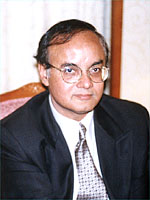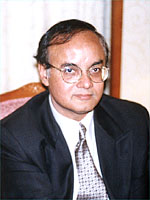
EX-director of WB to YT: “The government should not do things that the private sector can do.” [Archives:2001/05/Business & Economy]
January 29 2001
Tawfeek al-Shara’abi
Yemen Times

After meeting with officials and friends from the private sector, He held a press conference, met with media people and answered their inquiries about the many activities of the WB in Yemen.
In an answer to a YT question on what Yemen has achieved so far through the reforms programs, he said “Yemen has to be congratulated on what it has achieved in terms of laying the foundation for a good and solid economy. Now the foundation is there which means a stable macro economic situation and exchange rate policy. If we remember the conditions of 1995, we can see the difference.
“Yemen has also a still developing tradition of openness in the government towards elections and democracy which I think will stand Yemen in very good stead in the future. But at the same time the solid foundation of democracy can only be on the basis of growth and for that I think, much needs to be done to encourage the private sector, and to encourage private investment, Yemeni, Arab and foreign.”
Regarding the privatization policy that the Yemeni government is conducting on many crippled as well as successful institutions such as the National Bank in Aden and the Aden refinery, he said “To me privatization is extremely important if Yemen is to have a bright future. The government should not do things that the private sector can do. This lesson is learnt in every country all over the world. The government should focus on things it must do such as education, health and basic services, because the private sector has to come in .
“There are many reasons for this including that the government has never had enough money, enough resources or enough capacity and the government should never replace the private sector. And even if the government is making money, when the private sector comes to take over, it will make it expand and grow, bring more investment and that is the main reason why you want privatization.
“This is why we have been actively encouraging the government to undertake privatization. The privatization program is just at its starting phase right now. The National Bank of Yemen and the Aden refinery are being privatized. Hopefully, in the future, things like telecommunication, electricity, cement factories. We have been working very closely with the government so as to have a proper system. Privatization is not a one-day decision to privatize an institution and give it to someone. Privatization needs very careful preparation. It needs openness, transparency so people can see what is being done. So I would say that the privatization program is getting started. It has not taken off yet. The groundwork has been done and I hope progress will be achieved in the future.”
On economic reforms and how far Yemen has to go so as to reach it’s target, he said “What we know today is that economic development is not a start and finish process. The world is changing every day. If we take the case of Yemen as an example we will find that the next step to be taken is to see what Yemen can do to attract investment. But Yemen is not the only country that wants to do that, Arab and foreign countries want to do the same thing. So you constantly have to be working on this. Economic reforms are now simplifying procedures, diversifying and deregulating the economy, privatizing. These things have to be an on going process. We don’t want to worry just about today, we want to worry about the next ten years.”
——
[archive-e:05-v:2001-y:2001-d:2001-01-29-p:./2001/iss05/b&e.htm]


